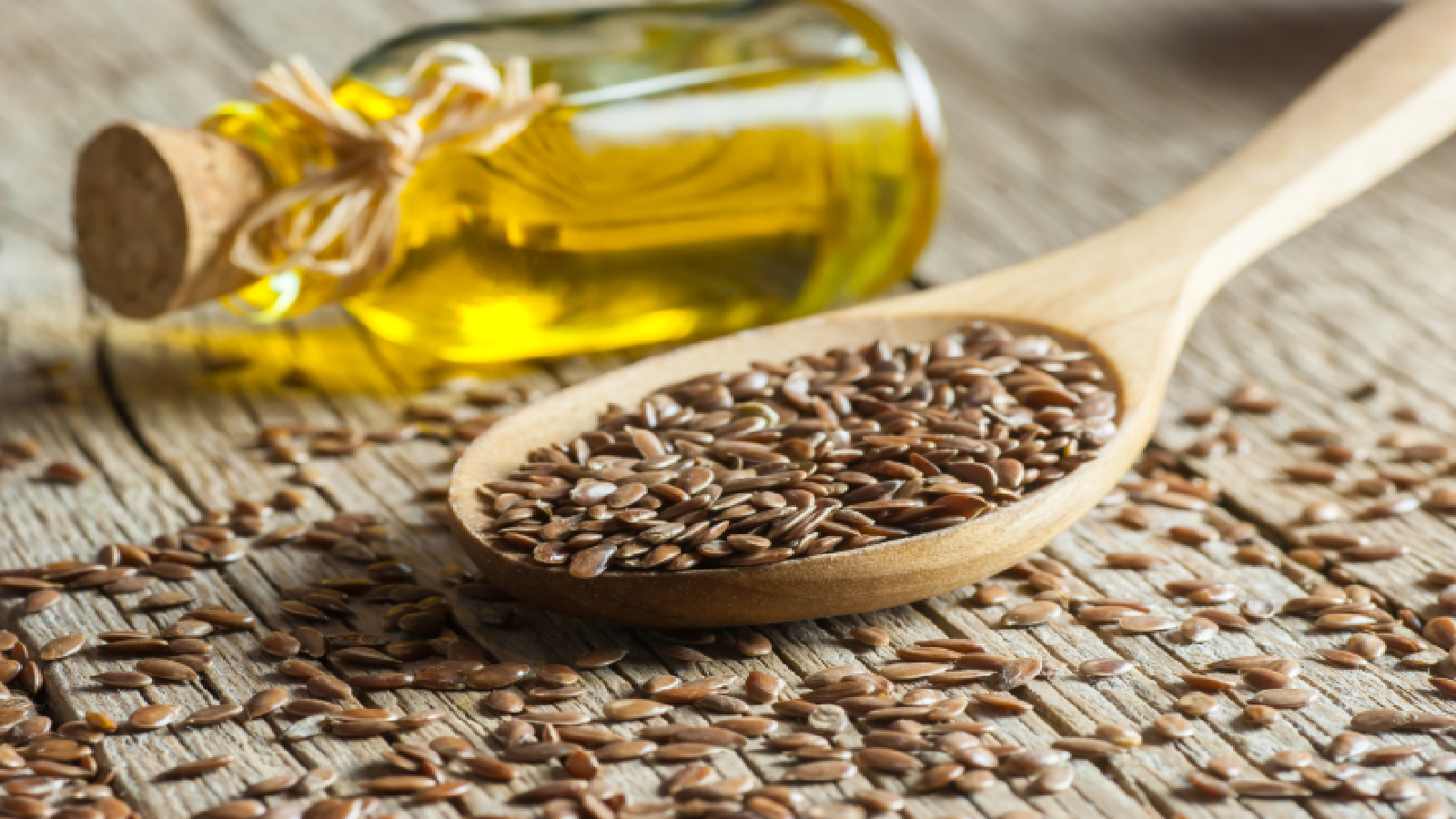Flaxseed oil—a guide to the benefits of this natural ingredient
An understated natural ingredient, flaxseed oil's health benefits have been enjoyed for generations


Flaxseed oil is one of those understated ingredients that's known the world over for its protective properties and various health benefits but, until relatively recently, rarely shouted about.
The oil is made from the dried natural seeds of the flax plant and is rich in nutrients, which help supplement your intake from a healthy daily diet.
Used since the earliest days of civilization, the versatility of flaxseed oil is evident—it has been known to be used for cooking and part of diet plans, as well as skincare routines. Flax seeds are readily available at health food stores and have become known as the new "superfood", claims that are backed by scientific research.
What is flaxseed oil?
Charles the Great (aka Charlemagne) was a renowned medieval emperor who ruled most of Western Europe from 768 to 814. He was among the first to realize the health benefits of flax seeds, ordering his loyal subjects to eat the ancient grain every day to promote healthy living. According to Healthline, flax seeds were given the name linum usitatissimum, which translates to "the most useful."
Today, flaxseed oil is also commonly called linseed oil or flax oil. It is created by a process of pressing ground flax seeds, which allows the natural oils to release.
Beyond its use in cooking, using flaxseed oil on the skin has been found to help hydrate and eliminate dryness, balance pH levels, improve elasticity, and remove blemishes. As such, it is a helpful part of any skincare routine.
The benefits of flaxseed oil
Whether taken in its original form (as seeds) or as an oil, flaxseed offers the same generous health benefits. It is an essential source of nutrients that is also a good source of vegan protein. In addition to that, a small amount of flaxseed offers the daily recommended supply of fiber intake.
Sign up for the woman&home newsletter
Sign up to our free daily email for the latest royal and entertainment news, interesting opinion, expert advice on styling and beauty trends, and no-nonsense guides to the health and wellness questions you want answered.
There are many benefits to using flaxseed oil every day:
- The oil is rich in Omega-3 fatty acids that help to reduce inflammation and protect the brain from aging prematurely. It is a useful alternative to fish oil (especially for vegans), ensuring you get the recommended ALA requirements of one tablespoon per day.
- Flaxseed oil can be beneficial to those trying to lose a few pounds—as part of a healthy diet, the protein-rich oil can help you feel full sooner (thought to be related to a hormone-stimulated reaction in the gut).
- Scientific research at the National Institutes of Health is finding flaxseed oil promotes a healthy heart. One tablespoon a day for 12 weeks has been shown to lower blood pressure significantly, compared to other similar oils.
- Flaxseed oil can help coronary arteries become more elastic, which has the impact of improving overall heart health.
- Limited studies are starting to find a correlation between the use of flaxseed oil and the reduction of the growth of cancer cells. While research is ongoing and not yet tested on humans, scientists are hopeful about the oil's healing properties.
- Flaxseed oil can be used as a laxative to treat constipation, increasing the frequency of bowel movements, and improving stool consistency. Its properties are similar to mineral oil and can also be used to treat diarrhea.
Potential side effects of flaxseed oil
Flaxseed oil is safe for human consumption with little-to-no known side effects. When taken in large quantities, bloating, diarrhea or frequent episodes of flatulence may occur. Drinking a full glass of water with each dose will help to eliminate any unexpected discomfort.
Always start using a new supplement cautiously. Begin gradually to see how your body tolerates the new nutrient, and work your way up to the full recommended dosage over a few weeks to avoid unwanted side effects.
When to use flaxseed oil (and when not to)
The Hemsley sisters—authors of the healthy eating cookbook Good + Simple—recommend using flaxseed oil in cooking, saying it is a must-have staple for any kitchen pantry. A healthy alternative to heavy cooking oils, flaxseed oil is perfect for drizzling over food or adding to dips.
Beyond the kitchen, flaxseed oil is also a favorite product for some women as a way to reduce wrinkles. It doesn't necessarily get applied externally, though. For best results, ingest one tablespoon four times a day. Build up to that dosage slowly to avoid digestion problems, seeing if your body agrees with this natural solution.
Eating unripe or raw flax seeds is discouraged for everyone, but pregnant women should not ingest flax seeds or flaxseed oil at all. Also, if you're undertaking any elective surgery, it's recommended that you avoid flax seeds for two weeks prior to reduce blood clotting risks.
As with any supplement, contact your physician before taking flaxseed oil to ensure it does not have any interactions with currently prescribed medications.
How to use and apply flaxseed oil practically
When it comes to healthy eating, an easy way to incorporate flax seeds into your diet is via a morning smoothie. Just a dash of flaxseed oil provides the necessary omega-3 fatty acids to give the body a well-deserved boost.
Thorbjorg, the self-proclaimed "queen of anti-aging", recommends combining one tablespoon of cold-pressed flaxseed oil with a juice and drinking it after every meal. The Danish nutritionist claims that "some women need an extra oil supplement for lunch and at night." She explains this further, saying "If you get hungry or crave sugar immediately after eating, you're probably one of them."
Implementing flaxseed oil into your daily skincare routine is also beneficial, and it can be used other topically or orally.
Whichever mode you opt for, a daily dose of flaxseeds should deliver the same generous and wide-ranging benefits that people have been enjoying for centuries. It's worth giving it a try.
A lifelong creative writer and beautyphile, Eunice Lucero-Lee graduated from De La Salle University in 2002 and was hired a year later to front all beauty coverage for Pink Magazine. A beauty, astrology, and pop culture obsessive and insider for over 18 years, Eunice is an internationally published editor (and now certified astrologer) whose work has been featured in publications such as Cosmopolitan, Esquire, and The Numinous, among many others.